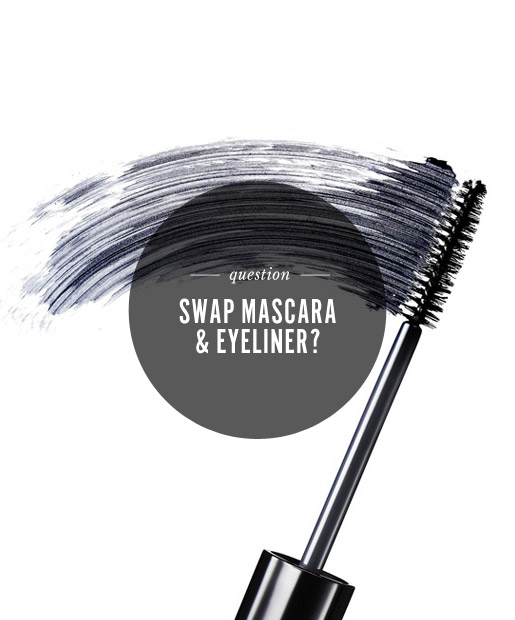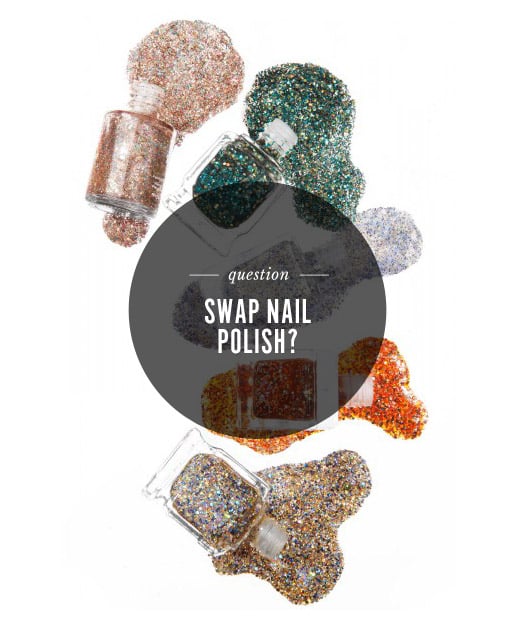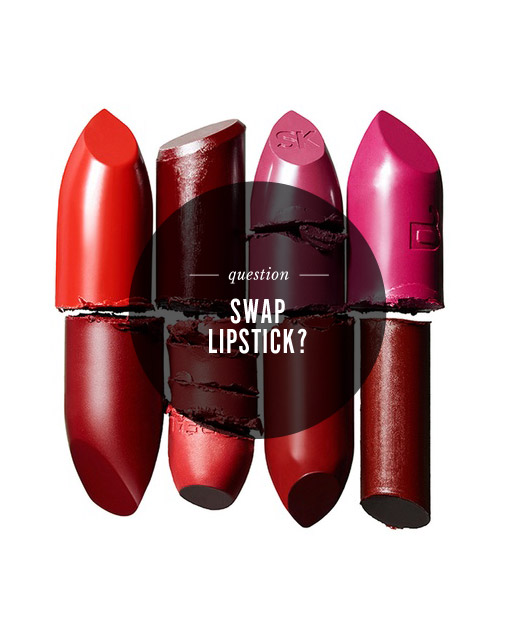"I think swapping some things [like nail polish] could be a good idea, and it's actually cleaner than nail salon polishes! Swapping things like mascara and eyeliner however ... you must have a death wish." - Tammy on TotalBeauty.com
Experts say: NYC dermatologist Dr. Ariel Ostad says previously used and shared oil-based and water-based eye products rank as the most dangerous, hands down. The most common makeup-sharing related infection he sees? Conjunctivitis, a.k.a. pink eye. "Not only is it extremely contagious, but people don't always know they're brewing it," Ostad told me. (Suddenly, I'm giving the side eye to everyone within my 10-foot proximity.) Oh, and there's also blepharitis, the inflammation of the super-sensitive eyelid. But that could be the least of your worries when swapping eye products.
Experts say: NYC dermatologist Dr. Ariel Ostad says previously used and shared oil-based and water-based eye products rank as the most dangerous, hands down. The most common makeup-sharing related infection he sees? Conjunctivitis, a.k.a. pink eye. "Not only is it extremely contagious, but people don't always know they're brewing it," Ostad told me. (Suddenly, I'm giving the side eye to everyone within my 10-foot proximity.) Oh, and there's also blepharitis, the inflammation of the super-sensitive eyelid. But that could be the least of your worries when swapping eye products.
Not to get all "you're gonna go blind" panicky, but Dr. Edward Kondrot, the director of the Healing The Eye & Wellness Center in Dade City, Fla., says if even the smallest particle of infected makeup gets lodged inside your eye next the cornea, it can be "devastating." Devastating as in ... you're gonna go blind. It's rare, but it happens. "Pseudomonas, an infectious bacteria, is of most concern since it grows in a moist environment and can lead to a serious corneal ulcer," says Dr. Kondrot. How does a pesky case of pinkeye jump to losing your sight for good? "A closed eye acts as a bacterial incubator," says Kondrot. A comforting thought as you drift off to sleep tonight.
The verdict: No. These are high risk, avoid at all costs.
The verdict: No. These are high risk, avoid at all costs.
"I'd for sure swap nail polishes. I have at least 100 from my online China Glaze buying binges, half I've never even tried, and the others I've used like once!" - Tamara on TotalBeauty.com
Experts say: Although nail polish -- which is both liquid-y and constantly being dipped into -- has all the characteristics of a "do not share" product, Hammer says it gets the closest to a green light (which is a good thing, since every mani-pedi we get utilizes communal polish). "Nail polishes are made of traditional solvent-based formulations and are typically not a problem because the solvents are quite toxic to bacteria," Hammer says. Makes sense: Many humans can't stand to smell the harsh fumes for long -- think about trying to swim in a vat of "Ballet Slippers" all day.
Experts say: Although nail polish -- which is both liquid-y and constantly being dipped into -- has all the characteristics of a "do not share" product, Hammer says it gets the closest to a green light (which is a good thing, since every mani-pedi we get utilizes communal polish). "Nail polishes are made of traditional solvent-based formulations and are typically not a problem because the solvents are quite toxic to bacteria," Hammer says. Makes sense: Many humans can't stand to smell the harsh fumes for long -- think about trying to swim in a vat of "Ballet Slippers" all day.
The verdict: Yes. Nail polishes are very low to no risk.
If the nail polish isn't clumpy or crusty (two telltale signs that it's time to toss that sucker out) you're good to go.
"You won't get herpes from a lipstick. Just be careful, sanitize well and use common sense. You think that when you go to a makeup artist they use brand new makeup and brushes on every person? Of course not, but they do clean everything between uses." - Kathleen on TotalBeauty.com
Experts say: Sharing or lending lip products always seems innocent ("Can I borrow some chapstick?"), but the cringe factor rises exponentially when you think of the viruses that fester on lips -- viruses that experts point out, are much smaller than bacteria and much harder to kill. I'm still scarred by the news that a women was suing M.A.C. after she allegedly contracted herpes after an artist applied a RiRi Woo sample to her lips, and both Hammer and Ostad said I was traumatized for good reason.
According to Hammer, lip products get a red flag thanks to herpes labialis, the infection caused by herpes simplex virus, which can live on oil-based products like lipsticks, chapsticks and gloss and get further smudged into the product every time you reapply. The next time your lip sprouts small, painful cold sore blisters, you may want to retrace your cosmetic steps ... and just looking for unsightly cold sores in your circle of friends may not always help in your detective work. "Your friend may be shedding virus and not realize she's getting a cold sore," says Dr. Ariel Ostad, a dermatologist and cosmetic dermatologic surgeon, For the uninitiated, the "viral shedding" phase is when the virus is traveling along nerves to the surface of the skin. The virus is contagious at this stage, but not visible. Tricky virus.
Experts say: Sharing or lending lip products always seems innocent ("Can I borrow some chapstick?"), but the cringe factor rises exponentially when you think of the viruses that fester on lips -- viruses that experts point out, are much smaller than bacteria and much harder to kill. I'm still scarred by the news that a women was suing M.A.C. after she allegedly contracted herpes after an artist applied a RiRi Woo sample to her lips, and both Hammer and Ostad said I was traumatized for good reason.
According to Hammer, lip products get a red flag thanks to herpes labialis, the infection caused by herpes simplex virus, which can live on oil-based products like lipsticks, chapsticks and gloss and get further smudged into the product every time you reapply. The next time your lip sprouts small, painful cold sore blisters, you may want to retrace your cosmetic steps ... and just looking for unsightly cold sores in your circle of friends may not always help in your detective work. "Your friend may be shedding virus and not realize she's getting a cold sore," says Dr. Ariel Ostad, a dermatologist and cosmetic dermatologic surgeon, For the uninitiated, the "viral shedding" phase is when the virus is traveling along nerves to the surface of the skin. The virus is contagious at this stage, but not visible. Tricky virus.






